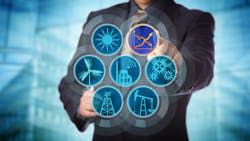Con Edison Announces Aggressive Expansion of Energy Efficiency Programs
Con Edison recently issued its Sustainability Report advocating for utility ownership of renewable projects at home in New York to help the state reach its clean energy goal of 100% renewable energy by 2040. Chief in the company's climate focus is addressing weather risks on its systems.
Con Edison's recent Climate Change Vulnerability Study stresses the importance of preparing company infrastructure to withstand and recover from major weather events. The company will be developing an implementation plan in the next six months detailing priority actions for the next 5, 10, and 20 years.
"When it comes to climate action, Con Edison envisions a clean future for the world's most complex energy grid," said John McAvoy, Con Edison's chairman and CEO. "Powering the lives of 10 million people, we are committed to building tomorrow's grid in a manner that supports renewable energy sources like solar and offshore wind, while empowering customers to make smarter energy choices."
The company's expanding array of energy efficiency programs have helped over a million customers, preventing seven million metric tons of carbon emissions, equal to taking more than a million cars off the road. Con Edison plans to aggressively pursue further energy-use reductions by tripling its energy efficiency programs, investing over US$1.5 billion by 2025. The effort is part of the company's Clean Energy Commitment outlined on the Con Edison website.
Since an estimated 30% of the city's carbon production comes from cars, trucks, and other vehicles, Con Edison is taking special steps to encourage the use of more electric vehicles (EVs). The company has launched a curbside charging project for EVs and will deliver 120 charging stations to 45 locations across the five boroughs. Installations are slated to begin later this year. Con Edison is also transitioning its fleet of light-duty vehicles to EVs, and exploring opportunities and alternative technologies to reduce fossil fuel use for medium- and heavy-duty trucks.
Con Edison continues to pursue options to reduce carbon emissions from natural gas infrastructure and offer customers new options that ensure safe, reliable delivery of the commodity to meet customer needs. While the company's gas main replacement program also has resulted in carbon reductions, pipeline constraints have tightened gas supply. Con Edison has ramped up energy efficiency for customers in response, providing incentives to adopt electric alternatives or new technologies like ground and air-source heat pumps.
To tap into the best and most promising clean energy technologies available, Con Edison is seeking innovative new solutions that will help customers reduce reliance on natural gas, offset the need to build additional pipeline infrastructure, and help New York State achieve its clean energy goals.
The company has enhanced reliability by interconnecting the 1.2 million-sq ft Kings Plaza shopping mall with its feeders for the first time in 50 years. This allows Con Edison to supply Kings Plaza customers with power and also permits it to export power to the grid from on-site generators, better managing demand in the Flatbush network.
Con Edison is promoting future green careers through its support of Sustainable South Bronx. Their 12-week green jobs training program prepares students through hands-on projects such as tree surveys, water quality testing, and shoreline restoration. Over 80% of the program's graduates secure employment. The company also spent US$294 million with minority- and women-owned businesses last year, and US$627 million with small businesses, the highest expenditure level in its history.
Con Edison's Sustainability Report uses the framework of the Task Force on Climate-Related Financial Disclosures (TCFD), which provides guidance on voluntary assessment and climate risk disclosure, facilitating reporting on environmental, social, and governance (ESG) issues. Additionally, utility specific Sustainability Accounting Standards Board (SASB) disclosures are intended to address financially material ESG topics, improving the quality and comparability of sustainability-related disclosure to investors.
